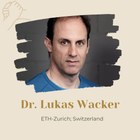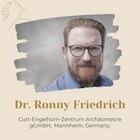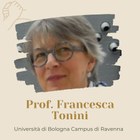
ETH-Zurich; Switzerland
He is an AMS 14C expert who works actively with our group for dating our extracted organic material and our target preparation. He has heavily contributed to push forward the frontiers in radiocarbon analysis towards higher precision. The compact AMS systems (MICADAS) developed at ETH are presently the state-of-the art instruments for highest precision radiocarbon analysis. Lukas Wacker was principal investigator of an international research project that extended the absolute radiocarbon calibration curve throughout the Younger Dryas into the Late Glacial time. He is also member of the IntCal Working Group.

Curt-Engelhorn-Zentrum Archäometrie gGmbH; Mannheim, Germany
Dr. Ronny Friedrich, studied physics at the Heidelberg University, Germany graduating in environmental physics in 2007 about dating and reconstructing paleoclimate information from various environmental archives. After working in and managing a large noble gas laboratory at Columbia University, USA for 6 years he is heading the radiocarbon laboratory at the Curt-Engelhorn-Center Archaeometry, Germany since 2014.

Università di Bologna Campus di Ravenna
Francesca Tonini is graduated in Restoration of Easel paintings and Wooden sculpture,
and in Conservation of Cultural Heritage with a thesis on baroque wooden sculpture.
Her main field of interest is the conservation-restoration of wooden polychrome sculpture, focused on the methodology of intervention, and education tools.
In compliance with Italian law – D.lgs. 22 gennaio 2004, n. 42, art. 9bis – she is a qualified Conservator-Restorer for the sectors:
2. architectural decorated surfaces,
3. painted artefacts on wooden and textile support,
4. carved wooden artefacts, furniture and wooden structures.
Member of ICOM-cc and Assistant coordinator of the SPAD Working group Sculpture, Polychromy, and Architectural Decorations, she cooperated as Consulting Advisor at the Projecto Retablos - Conservation of Wooden Polychromed Altarpieces with the Getty Conservation Institute in Los Angeles and the Instituto Andaluz del Patrimonio Historico in Seville.
Member of the RECH Scientific Committee - Retouching of Cultural Heritage, she frequently serves as peer-reviewer for congresses and professional international journals.
She takes part in various international conferences, seminars and workshops as a speaker and moderator.
As an editor she has written many essays and articles on the study and restoration of wooden sculpture.
In 2015 she published the handbook “La scultura lignea. Tecniche e restauro. Manuale per allievi restauratori”.
As Adjunct professor in Conservation-restoration she cooperates with the Universities of Bologna and Urbino, and with Accademia Belle Arti in Como.